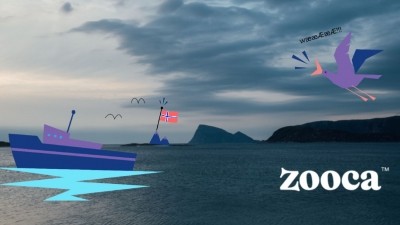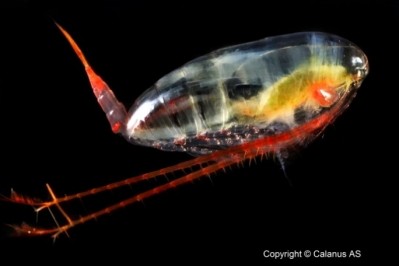Calanus Oil included in Norway’s fish oil application to the Codex Alimentarius

The Tromsø-based firm’s Calanus oil is named by Norwegian Food Safety Authority in an ongoing application to be included in the Codex Standard ‘CODEX STAN 329-2017,’ adopted three years ago.
“Calanus has suggested to the Norwegian Food Authority to apply for inclusion in the Codex standard,” says Jan Erik Olsen, head of sales and marketing, human health & nutrition at Calanus.
“Because our company holds the deepest knowledge on this resource and the product(s) derived from it, much responsibility will rest on us when the member countries ask questions or need deeper insight. So, we expect to be involved together with the authorities.
“Timeline for listing in Codex will typically be 2-4 years. The main reason is that Codex meetings are held every second year, so proceedings take a while.”
Olsen adds the foundation for the application refers to Norway establishing commercial quotas on the resource. This is in order to prepare for increased raw material access by broadening the market access.
“In the bioeconomy strategy of Norway, the utilisation of new marine resources is a priority,” he explains.
“During the last 10-15 years, Calanus has contributed knowledge about Calanus finmarchicus, the species from which Calanus oil is derived from.
“This knowledge has been used to establish commercial quotas, which will allow for significant harvesting activity.
“One of the challenges is that this is a new raw material with few established areas of use, so it will take innovation to expand areas of use, and it is also key to contribute to the demand in the markets, for instance through support of regulatory approvals like Codex.
“So, the application is founded on the strategy of Norway, more than being a service to Calanus AS.
“As this raw material is also high in essential fatty acids like EPA, DHA as well as Stearidonic Acid (SDA), it is considered to be one of few species that can contribute to filling the future gap between demand and supplying capabilities of omega-3s.”
CODEX STAN 329-2017
CODEX STAN 329-2017 refers to oils derived from fish and shellfish that applies to fish oils used in food and in food supplements where those are regulated as foods.
Whilst not legally binding; guidelines, standards and recommendations produced by Codex provide a template for laws and are used by the World Trade Organization (WTO) as an agreed benchmark in global trade disputes.
The Standard covers processes to obtain fish oil for human consumption that may involve extraction of crude oil from raw material and its refinement.
Named fish oils are derived from specific raw materials and are characteristic of the major fish or shellfish taxon from which the oil is extracted.
Such oils currently on the list include Anchovy oil (derived from Engraulis ringens and other species of the genus Engraulis (Engraulidae)) and tuna oil (derived from the species of the genus Thunnus and from the species Katsuwonus pelamis (Scombridae).
Other oils include Krill oil (derived from Euphausia superba), of which its major components are triglycerides and phospholipids.
Calanus oil is considered the most numerous animal species in the Norwegian Sea and has the largest biomass production in the Northern hemisphere.
The annual biomass production is 300 million tons, which is twice as much as all the World´s fishery and aquaculture together.
“Calanus oil as a named oil in the Standard for Fish Oils refer to oil derived from the species Calanus finmarchicus,” says Åse Kristine Mikalsen, Calanus’ quality manager. “The oil is primarily composed of wax esters and therefore differ from traditional fish oil.”
“GOED supports Calanus and the Norwegian Authorities’ Codex submission to include Calanus as a named oil in the Standard for Fish Oils,” adds GOED´s executive director, Ellen Schutt.
“The benefits of Eicosapentaenoic Acid (EPA) and Docosahexaenoic Acid (DHA)-which are contained in Calanus oil – are important for public health and we would like to see the oil accepted on a global scale.”
Further reference points
Other named fish oils mentioned in the CODEX include concentrated fish oil, which contains 35 to 50 w/w % fatty acids as sum of C20:5 (omega-3) EPA and C22:6 (omega-3) DHA.
Highly concentrated fish oil also makes the list with these extracts needing to contain more than 50 w/w % fatty acids as sum of EPA and DHA.
Named oils’ vitamin content is also covered by the CODEX with fish liver oils (except the liver oil of deep-sea shark) requiring a vitamin A content equal to or exceeding 40 micrograms (µg) of retinol equivalents per millilitre (ml) of oil.
Instructions for vitamin D content deems the value to be equal to or exceeding 1.0 µg/ml with maximum levels for vitamins A and D needing to be in accordance with the needs of each individual country including, where appropriate, the prohibition of the use of particular vitamins.
Labelling requirements for these vitamins state that for fish liver oils the content in vitamin A and vitamin D, naturally present or restored, shall be given if required by country of retail sale.
The instruction adds that for all fish oils covered by this standard the content of EPA and DHA shall be given if required by country of retail sale.
“We are very happy that Norwegian Authorities have endorsed Calanus oil and want to have it listed in the Codex Standard,” says Calanus CEO, Gunnar Rørstad.
“For us, this is a fantastic recognition of the effort we have made to develop harvesting and manufacturing technology and knowledge around Calanus finmarchicus.”
“To achieve Codex listing would be a statement about the prospects of Calanus oil and shows that the international community believes in the importance of making Calanus oil available to the people of the world,” he adds.















